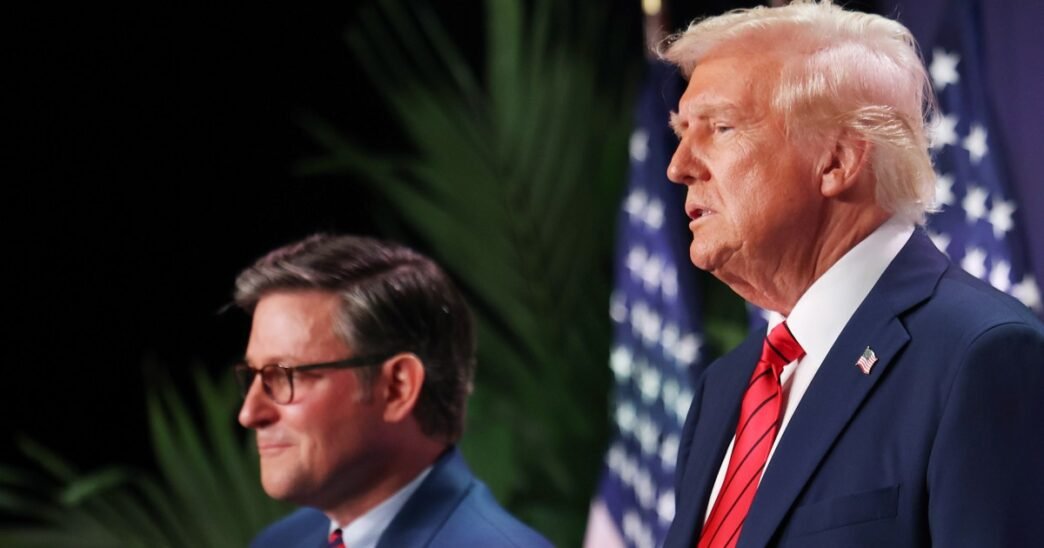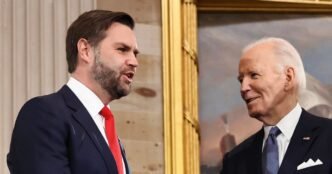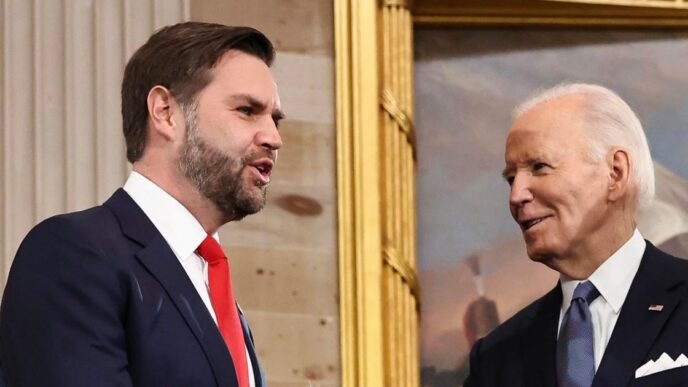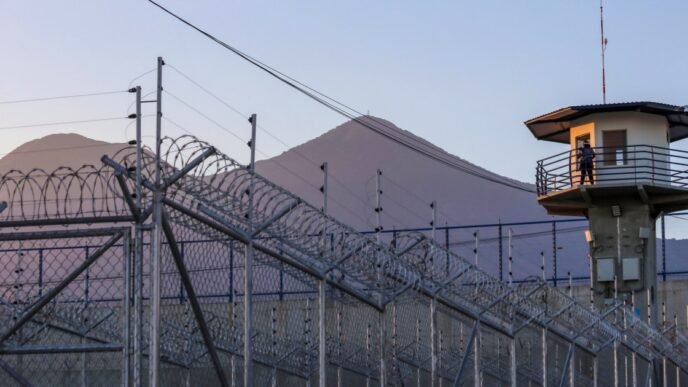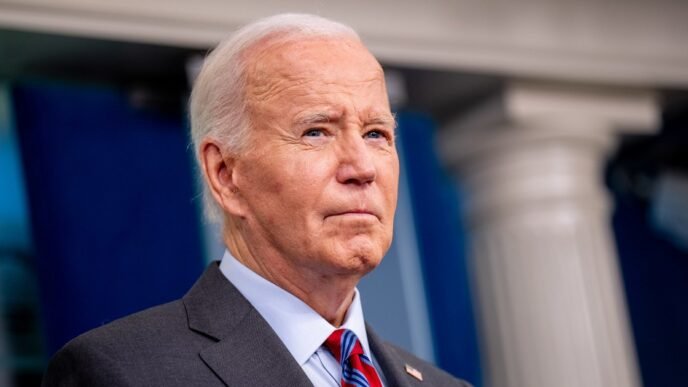Welcome to the online version of From the Politics Desk, an evening newsletter that brings you the NBC News Politics team’s latest reporting and analysis from the White House, Capitol Hill and the campaign trail.
Happy Monday and welcome to a critical week for President Donald Trump’s agenda on Capitol Hill. Sahil Kapur breaks down three key issues House GOP leaders will need to resolve if they hope to meet their Memorial Day deadline for passage. Plus, Peter Nicholas and Megan Shannon take a look at the members of the Trump administration who are pulling double, triple and even quadruple duty.
Sign up to receive this newsletter in your inbox every weekday here.
— Adam Wollner
 We want to hear from you!
We want to hear from you!
Have a question for the NBC News Politics Desk about the latest from the White House, Capitol Hill or the campaign trail?
Send your questions to politicsnewsletter@nbcuni.com and we may answer them in a future edition of the newsletter.
3 sticky issues facing Trump’s big bill — and how GOP leaders are trying to resolve them
By Sahil Kapur
It’s a huge week for House Republicans as they seek to pass a massive bill for President Donald Trump’s agenda through their narrow majority along party lines, as various factions of holdouts continue to demand changes.
GOP leaders cleared an important hurdle late Sunday night, when four conservative hard-liners on the House Budget Committee relented and allowed the bill to advance after blocking it two days earlier. Now the package goes to the Rules Committee, where party leaders want to make changes and meet Wednesday at 1 a.m. ET to send it to the floor.
And Trump is getting involved in the final push ahead of Speaker Mike Johnson’s Memorial Day deadline: He’s expected to join a House Republican conference meeting Tuesday morning.
Medicaid cuts and limits: Conservatives have complained about provisions in the bill that front-load benefits and delay the spending cuts. That includes cuts to Medicaid — in the form of stricter work requirements that were slated to begin in 2029, among other things. To appease right-wing holdouts, that date will move to the beginning of 2027, House Majority Leader Steve Scalise, R-La., said Monday on CNBC.
But would that cost votes among more moderate Republicans? Scalise didn’t make any guarantees that they’d stay on board, saying only that leadership is “talking to all those members” about it, and that “everybody knew this was something that we were working on.”
It will be a difficult balance to strike as swing-district Republicans are already facing political attacks over the Medicaid cuts.
Clean energy cuts: There’s a similar dilemma on clean energy funding cuts. The legislation repeals major pieces of the Inflation Reduction Act, which Democrats passed in 2022 along party lines, that provide funding and tax credits to promote clean energy
But conservatives want to be more aggressive in rolling back the money, in part to reduce the added red ink under the bill. The problem is a lot of the funds benefit red and purple districts represented by Republicans. And politically endangered members don’t like taking funds away. GOP leaders need to find a way to placate both those factions.
SALT deduction: The state and local tax deduction has become perhaps the biggest nuisance for party leaders. It is a unique problem because a group of blue-state Republicans have insisted on a significant expansion of the SALT deduction of $10,000 per tax filer, which the party instituted in 2017.
Top Republicans have offered to raise it to $30,000, but that’s still not enough for a handful of members who have made it a red line to win their support for the bill. Raising the deduction is expensive, and risks alienating not just ultra-conservative members but other center-right Republicans in districts where SALT isn’t a big issue.
Rep. Nick LaLota, R-N.Y., the loudest GOP voice advocating a bigger SALT deduction, has even suggested raising marginal tax rates on the wealthy in order to help finance it. That idea is strongly opposed by many in the party.
Trump taps his most trusted officials to do as many as four jobs — at the same time
By Peter Nicholas and Megan Shannon
President Donald Trump has taken some Cabinet members and senior administration officials and layered on additional work that calls for wholly different sets of skills.
The dual postings give rise to a tangle of managerial challenges, constitutional questions and potential conflicts of interest, critics contend.
Jamieson Greer: As U.S. trade representative, Greer has been flying around the world to negotiate with countries over the tariffs that the president imposed. On top of that, he is the government’s official watchdog. The White House has appointed Greer both acting director of the Office of Government Ethics and acting head of the Office of Special Counsel.
Daniel Driscoll: He is not only secret of the Army, but the acting director of the Bureau of Alcohol, Tobacco, Firearms and Explosives. The first job is about keeping soldiers in fighting trim; the second includes cracking down on contraband cigarettes.
Marco Rubio: His titles include secret of state, national security adviser and acting head of the National Archives and Records Administration. He is also the acting administrator of the U.S. Agency for International Development — or what’s left of it after the Trump administration effectively dismantled it.
Todd Blanche: In addition to being deputy attorney general, Trump recently named Blanche as the acting head of the Libr of Congress. The Justice Department upholds the nation’s laws and advances Trump’s agenda; the libr is supposed to give lawmakers independent research they request.
Read more from Peter and Megan →
 Today’s top stories
Today’s top stories
SCOTUS watch: The Supreme Court allowed the Trump administration to move forward with an effort to revoke certain legal protections for Venezuelan immigrants. Read more →
High-stakes call: After speaking with Russian President Vladimir Putin by phone for two hours, Trump wrote on social media that Russia and Ukraine “will immediately start negotiations toward a Ceasefire and, more importantly, an END to the War.” Read more →
Biden’s diagnosis: Former President Joe Biden has been diagnosed with an aggressive form of prostate cancer. Read more →
Here’s Hur: Audio of special counsel Robert Hur’s interview with Biden was released over the weekend, confirming the then-president’s reported memory lapses during the questioning. Read more →
Frequent flyer: Vice President JD Vance made his second visit to the Vatican in less than a month, for Pope Leo XIV’s inaugural Mass, as he continues to emphasize his Catholic faith despite some criticism from church leaders. Read more →
Signed, sealed, delivered: Trump signed legislation that bans the nonconsensual online publication of sexually explicit images and videos that are both authentic and computer-generated. Read more →
Taking a pass: Rep. Lauren Underwood decided against entering the crowded Democratic prim to replace retiring Sen. Dick Durbin in Illinois. Read more →
That’s debatable: Five of the Democratic candidates for governor in New Jersey faced off in their final debate, where they vowed to fight Trump and laid out their paths to victory in November. The prim is on June 10. Read more →
- Follow live politics updates →
That’s all From the Politics Desk for now. Today’s newsletter was compiled by Adam Wollner and Bridget Bowman.
If you have feedback — likes or dislikes — email us at politicsnewsletter@nbcuni.com
And if you’re a fan, please share with everyone and anyone. They can sign up here.

